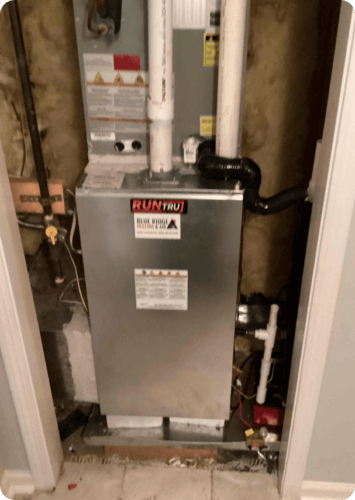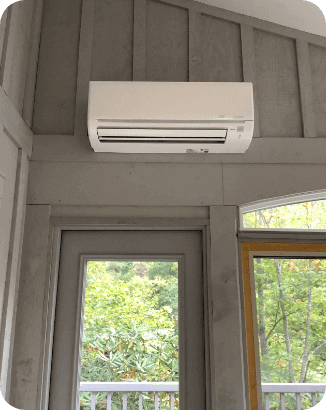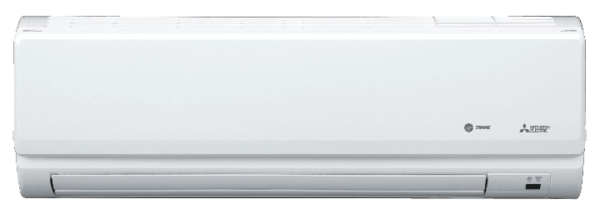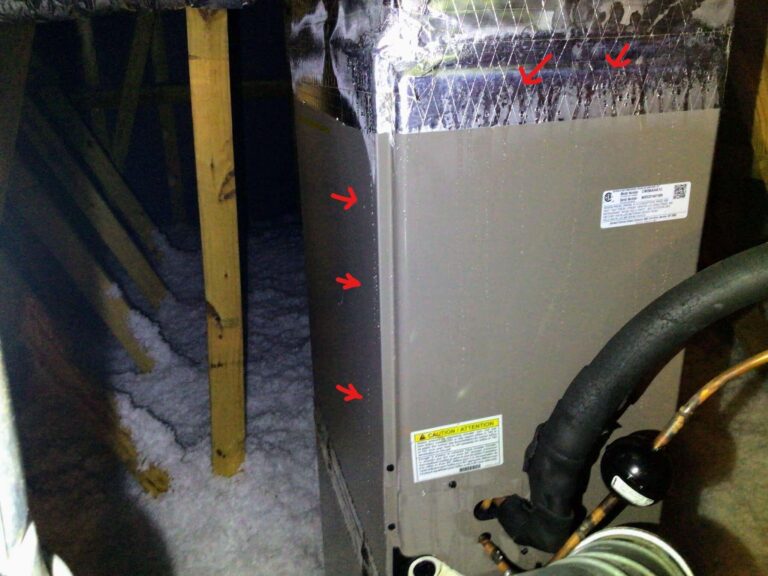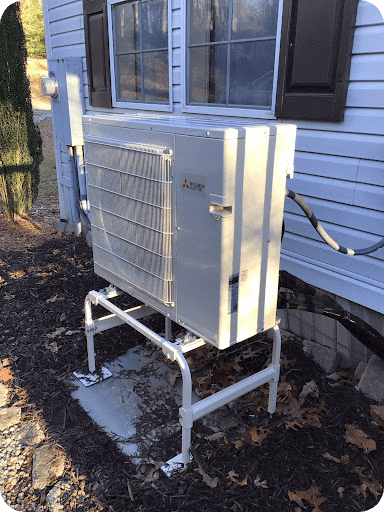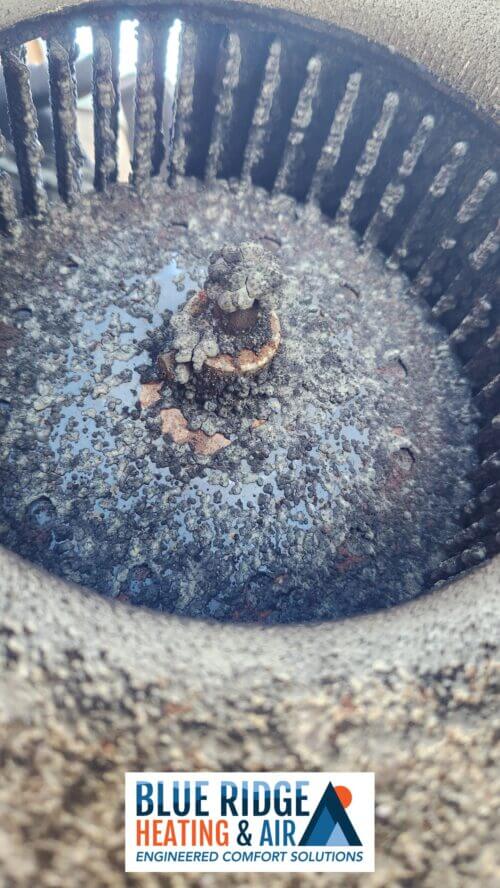 Ductless mini split heat pumps have become more and more popular in the Greenville, South Carolina area, which is the primary reason we have made a conscious business decision to be the region’s local heat pump specialist. These ductless mini split systems offer energy-efficient cooling and heating, making them an attractive option for many homeowners, including ones in our neighborhoods like Greenville, SC, and Brevard, NC.
Ductless mini split heat pumps have become more and more popular in the Greenville, South Carolina area, which is the primary reason we have made a conscious business decision to be the region’s local heat pump specialist. These ductless mini split systems offer energy-efficient cooling and heating, making them an attractive option for many homeowners, including ones in our neighborhoods like Greenville, SC, and Brevard, NC.
In this article, we will explore the average lifespan of mini split systems, compare their longevity with gas furnaces, and provide essential tips to keep your mini split running efficiently for years after you have it installed.
Before I entered the HVAC industry, I worked as a design, quality, and reliability engineer for GE. Now that I work with mini split systems every day, it’s easy to see how they provide quality and longevity, because of their innovative design and technology.
Average Mini Split Lifespan
When considering the lifespan of a mini split system, we get the question, “How long do
mini split systems last?”. It’s important to understand the technology the system uses to operate.
Mini split systems consist of an outdoor unit and one or more indoor units, connected by refrigerant lines. The outdoor unit houses the compressor and condenser, while the indoor units distribute the conditioned air. All the air is carried through line set that runs on the outside of your home or business.
On average, a well-maintained mini split system can last for about 12 to 16 years. With proper care and maintenance, some systems have been known to operate effectively for up to 20 years. It’s important to note that the lifespan can vary depending on factors such as usage, quality of the installation, and regular maintenance.
Mini Split Lifespan Vs. Gas Furnace

When comparing the lifespan of mini split systems with gas furnaces, it’s important to consider their respective roles in heating. Mini split systems excel at providing both heating and cooling, while gas furnaces focus solely on heating. Gas furnaces typically have a longer lifespan than mini split systems, averaging around 15 to 20 years.
However, it’s worth noting that mini split systems offer both zoned heating and cooling. They also have greater energy efficiency and flexibility. Additionally, advancements in mini split technology continue to improve their performance and longevity. While gas furnaces may have a slightly longer lifespan, they require you to also install a separate AC system, unlike a mini split that can do both.
How to Keep Your Mini Split Running Efficiently
To ensure that your mini split system operates optimally for its whole lifespan, regular maintenance and proper care are essential. Here are some best practices to follow:
Proper Installation
Proper installation for your ductless mini split is essential to making sure it lasts as long as it should. Hiring a qualified HVAC company or technician experienced in installing ductless mini splits ensures that the system is correctly set up. You may ask, “Can I install a mini split myself?”. We recommend against that. If you have your system set up improperly, you run the risk of running into malfunctions and having your system die early.
Clean the Filters
Regularly cleaning the filters is vital for maintaining the efficiency and longevity of your mini split system. Clogged filters restrict airflow, forcing the system to work harder and potentially leading to breakdowns. They also result in dirtier air, making it less healthy to breathe.
Cleanable filters should be washed according to the manufacturer’s instructions, while disposable filters should be replaced as recommended. This is something you can do yourself with ease!
Seasonal Tune-Ups
Schedule annual or seasonal tune-ups with a professional HVAC technician. These maintenance visits typically involve thorough inspections, cleaning of components, lubrication of moving parts, and performance checks. By addressing any potential issues early on, you can prevent major problems and extend the lifespan of your mini split system.
Deep Cleaning
 Performing deep cleaning of your mini split system once every year or 2 helps remove accumulated debris and maintain its efficiency. For this cleaning a special machine is needed to power wash the inside, and catch the dirty water.
Performing deep cleaning of your mini split system once every year or 2 helps remove accumulated debris and maintain its efficiency. For this cleaning a special machine is needed to power wash the inside, and catch the dirty water.
A technician will focus on cleaning the evaporator coils, condenser coils, and fan blades. Then they will use a soft brush or cloth to gently remove dust and small particles. Finally, they will lubricate any moving parts as recommended by the manufacturer.
If you are looking for reputable mini split installers in Brevard, NC, give us a call at (864) 485-6509. If you are located in North Carolina, call us at (828) 415-3335.
How Long Mini Splits Last: FAQs
Here are answers to some frequently asked questions about the lifespan and maintenance of mini split systems:
How often do you need to replace a mini split?
On average, mini split systems can last between 12 to 16 years. However, the need for replacement may vary depending on factors such as usage and maintenance. Regular maintenance and timely deep cleanings can extend the lifespan of your mini split system to 20+ years.
Do mini splits need maintenance?
Yes, mini split systems require regular maintenance to ensure optimal performance and longevity. Routine maintenance tasks include cleaning or replacing filters, inspecting refrigerant levels, checking electrical connections, and cleaning coils. Professional preventative maintenance is recommended at least once a year.
Can you leave a mini split on all day?
Mini split systems are designed for energy-efficient use, and inverter technology. This means instead of turning off and on, your system runs at a lower speed to maintain temperatures. Leaving your mini split system on all day is generally safe and efficient, especially if you adjust the temperature settings according to room occupancy and desired comfort levels. Modern mini splits often feature programmable timers and smart controls for enhanced energy management.
In conclusion, mini split systems have an average lifespan of 12 to 16 years, with proper maintenance and care. While gas furnaces may last slightly longer, mini split systems offer energy-efficient solutions for both cooling and heating. Regular maintenance, along with energy-efficient use, will help you enjoy the benefits of your mini split system for years to come.

